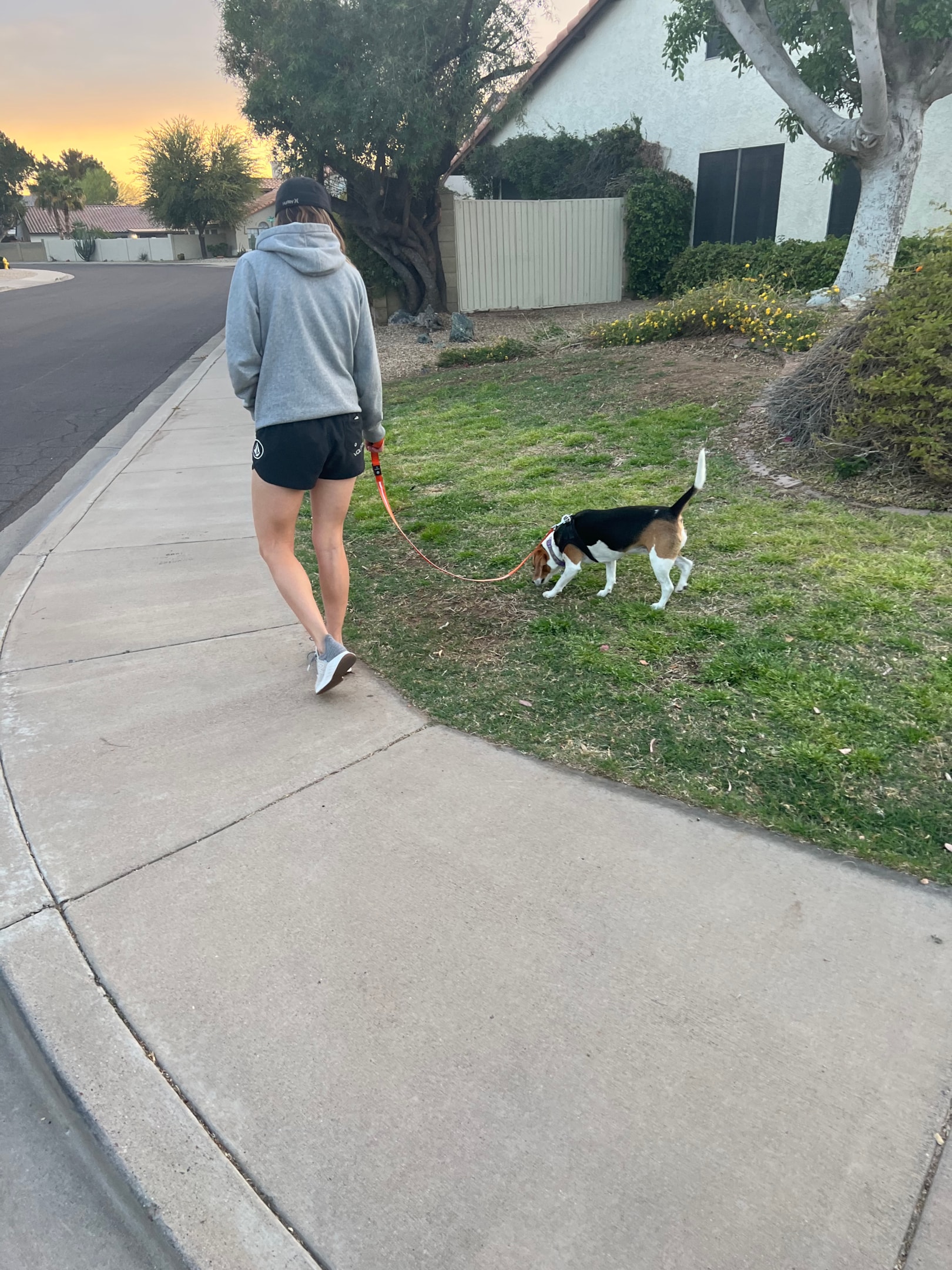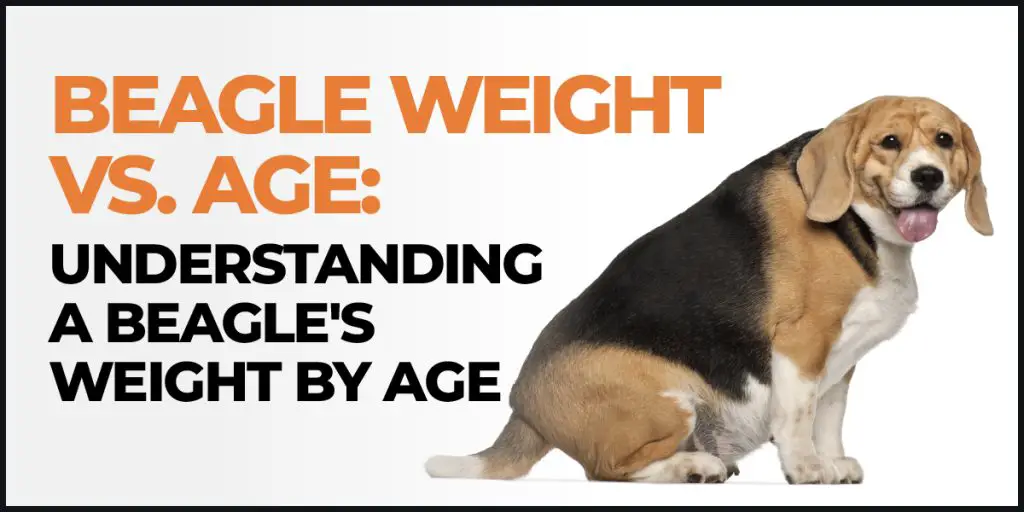Wondering how much your beagle should weigh at different ages? This guide provides details on beagle weight by age, helping you ensure your pet is growing healthily. Learn about weight milestones and factors that influence your beagle’s weight. Owners should reach out to the breeder or pet store for information on the specific size group of their Beagle puppy.
Key Takeaways
- Beagles reach their adult weight around 1.5 years old, making it essential to track their growth milestones for health.
- A balanced diet and regular exercise are crucial for maintaining a healthy weight in Beagles, as they are prone to obesity.
- Regular monitoring and veterinary check-ups help prevent weight-related health issues like diabetes and joint pain in Beagles.
- Pet insurance can help manage unexpected veterinary expenses and ensure long-term health care for Beagles.
Find out how to train your beagle to be the well-behaved pup you desire – Read Free Report
Beagle Breed Overview
The Beagle breed is a popular and beloved dog breed known for its friendly, curious, and energetic personality. Originally bred for rabbit hunting, Beagles have become a favorite among dog owners due to their small size, gentle nature, and adaptability to family life.
Beagles are part of the hound group and are recognized by the American Kennel Club. They typically stand about 13 to 15 inches tall and weigh between 20 to 30 pounds, making them a manageable size for most households. Their keen sense of smell and tracking abilities are legendary, a trait that stems from their history as hunting dogs.
One of the most endearing qualities of the Beagle breed is their sociable and affectionate nature. They are great with children and other pets, making them an excellent choice for families. However, their strong hunting instincts mean they require regular exercise and mental stimulation to stay happy and healthy.
Beagles are also known for their vocal nature. They have a distinctive bark and howl, which they use to communicate. This trait, while charming, means they may not be the best fit for apartment living unless properly trained.
Overall, the Beagle breed is a wonderful companion for those who can meet their exercise and social needs. Their loving and playful demeanor makes them a joy to have as part of the family.
Understanding Beagle Weight by Age

As Beagle owners, watching our pups grow is a joy and crucial for their health. Beagle weight changes significantly from puppyhood to adulthood, making it important for pet parents to understand this progression. It’s not just about their size but ensuring they grow at a healthy rate.
Most Beagles reach their adult weight at around 1.5 years. This timeline helps us monitor their growth and ensure they’re on track. Recognizing these weight milestones allows us to provide the best care and address potential health issues early. The National Beagle Club has played a significant role in promoting the best interests of the breed and contributing to the establishment of standards for Beagle breeding.
Beagle Puppy Growth Stages
Beagle puppies experience several growth stages, each with unique characteristics. An indicator that a Beagle pup is still growing is having large paws compared to their body, hinting that our little Beagle still has some growing to do.
Adult Beagles usually achieve their full height by around eight months and reach their adult weight at about 18 months. Knowing these growth stages helps ensure our adult beagle puppies are developing properly. Regularly checking their weight against a Beagle growth chart can track their progress and catch any issues early.
Average Weight at Key Milestones
Tracking a Beagle’s weight at key milestones ensures healthy growth. At one month, smaller Beagle puppies typically weigh between 2 to 3 pounds. This early stage sets the foundation for their future growth.
By six months, a larger beagle breed can weigh between 14 to 18 pounds. These milestones provide a clear picture of healthy growth. A growth chart helps visualize this curve, making it easier to monitor their development.
Factors Influencing Beagle Weight

Several factors influence a Beagle’s weight, and knowing these can help maintain their health. Diet and nutrition play a significant role, as the right nutrient balance supports growth and prevents obesity. Regular physical activity is also key for maintaining a healthy weight and avoiding obesity-related issues.
Genetics also influence a Beagle’s size and weight, with some naturally predisposed to be larger or smaller. Considering all these factors helps us better understand and manage our Beagle’s weight. Regular veterinary care is crucial for a dog's long-term health, helping to detect and treat common health issues early.
Diet and Nutrition
A well-balanced diet maintains a Beagle’s ideal weight and overall health. They require a high-protein diet to support their active lifestyle, especially in activities like agility or tracking. Their strong appetite and sense of smell can lead to overeating, so measuring food portions based on weight and activity level is important.
A nutrient-rich diet helps prevent weight gain and supports overall health. Beagles tend to overeat, which can lead to obesity if not monitored. Ensuring they receive the right amount of food and nutrients is crucial for their health.
Exercise and Activity Levels
Regular exercise helps Beagles maintain a healthy weight and prevents obesity. Activities that stimulate their hunting instincts, like running after a ball or playing in a safe area, can also reduce destructive behaviors by keeping pocket beagles occupied.
Beagles need at least one daily walk of 20 to 30 minutes to manage their weight effectively. Regular physical activity significantly contributes to their mental and physical health, keeping them fit and happy.
Genetic Factors
Genetics determine a Beagle’s size and weight, with variations even within the same breed. Unlike many other dog breeds, Beagle size does not vary significantly based on gender. These predispositions can lead to differences in metabolism, impacting weight management. Male Beagles typically reach their ideal adult dog weight within 18 months.
Understanding these genetic factors helps us tailor their diet and exercise needs accordingly.
Monitoring Your Beagle's Weight
Monitoring a Beagle puppy’s weight ensures healthy growth and prevents obesity. Regularly checking their weight and adjusting their diet helps avoid health issues related to being overweight. Beagles have a strong appetite and can easily gain weight if not monitored, so keeping an eye on their food intake is important. Pet insurance can help manage veterinary expenses, ensuring Beagles receive the best possible care.
Tools like a Beagle growth chart can effectively track their weight and development stages. This visual reference shows if they are on the right growth curve and helps identify potential health issues early.
Using a Beagle Growth Chart
A growth chart tracks your Beagle’s weight and size over time, providing a visual reference for their development. By plotting their weight at various stages, we can see if they are growing healthily and make necessary adjustments to their diet or exercise routine.
Using a growth chart also helps monitor their health and catch potential issues early. Keeping track of their growth ensures they develop properly and allows us to provide the best care possible.
Signs of Healthy Weight vs. Overweight
A healthy-weight Beagle should have easily felt ribs and a visible waistline when viewed from the side. This quick check of their rib cage indicates their weight status; ribs should be easily felt without pressing hard. A visible waistline and easily felt ribs are healthy indicators, while a rounded belly may signal overweight.
Keeping an eye on these physical signs helps ensure our Beagle maintains a healthy weight and avoids obesity-related health issues.
Maintaining a Healthy Weight for Your Beagle

Maintaining a healthy weight for your Beagle involves a balanced diet, regular exercise, and routine veterinary check-ups. Beagles can weigh between 25 to 30 pounds, and their calorie intake should be adjusted according to their activity level. Considering these factors helps keep our Beagles healthy and avoid weight-related issues.
A balanced diet and regular physical activity prevent weight gain and promote overall health. Routine vet visits help assess their weight and make necessary adjustments to their care plan.
In addition to keeping your Beagle happy and healthy, why not show off your love for this amazing breed? Check out these beagle-themed gifts for unique and charming items that any beagle lover would adore. Whether it’s a gift for a fellow pet parent or something special for yourself, these items celebrate the playful and loving nature of beagles.
Balanced Diet Tips
Beagles typically need between 674 and 922 calories daily, depending on their activity level. A high-protein diet with meats as primary ingredients supports their active lifestyles. Proper nutrition during early stages is crucial to prevent stunted growth and ensure healthy development.
Poor nutrition during formative years can lead to stunted growth, impacting overall health. Ensuring they receive a balanced diet with the right amount of proteins, carbohydrates, and fats supports their energy needs and maintains a healthy weight.
Exercise Recommendations
Routine physical activity prevents weight gain and promotes good health in Beagles. Adult Beagles typically require 30 minutes to an hour of exercise daily to maintain their physical health and prevent weight gain. Regular walks and playtime in a safe area effectively help Beagles burn calories and stay active.
Increased regular activity is positively correlated with maintaining a healthy weight, while less active dogs are more prone to obesity. Engaging in activities that stimulate their hunting instincts can also reduce destructive behaviors.
Regular Veterinary Check-ups
Routine vet visits assess your Beagle’s weight, overall health, and necessary dietary or exercise adjustments. Annual check-ups monitor their health and adjust care plans as needed. Regular screenings help detect health issues early, which is crucial for maintaining a Beagle’s weight. Pet insurance can cover substantial veterinary expenses, helping to ensure Beagles receive the best possible care.
Veterinary guidance assists in managing a Beagle’s weight and overall health through regular assessments. Regular check-ups monitor their growth and detect nutritional deficiencies early.
Common Weight-Related Health Issues in Beagles

Regularly weight tracking helps prevent obesity-related Beagle health issues. Keeping a close watch on their weight prevents problems like joint issues and heart disease. Beagles are susceptible to overeating, which can lead to obesity if not monitored.
Obesity in dogs leads to serious health risks, including a decrease in lifespan and quality of life. Monitoring our Beagle’s weight helps prevent these risks and ensures they live a healthy, happy life, contributing to the dog’s long term health. Regular veterinary care is crucial for a dog's long-term health, helping to detect and treat common health issues early.
Obesity and Related Conditions
Start by measuring the height of the plant, which is approximately 12 inches tall. This measurement will help you determine the best pot size for optimal growth.
Obesity in Beagles can lead to serious problems such as diabetes and joint pain, impacting their mobility and comfort. Overweight Beagles may display reduced energy levels, needing more naps or showing movement difficulty. Cervical intervertebral disk disease can be exacerbated by obesity, affecting their mobility.
After:
Obesity in Beagles can lead to serious problems such as:
- Diabetes
- Joint pain, impacting their mobility and comfort
- Reduced energy levels, needing more naps or showing movement difficulty
- Exacerbation of cervical intervertebral disk disease, affecting their mobility
Maintaining a healthy weight for our Beagle helps prevent these conditions, ensuring they remain active and comfortable.
Stunted Growth
Stunted growth in Beagles leads to health issues and affects overall development. Nutritional deficiencies during early stages can result in stunted growth. Ensuring a balanced diet rich in essential nutrients prevents stunted growth.
Genetic factors may also contribute to a dog’s growth potential, leading to stunting if lineage indicates smaller size. Regular veterinary check-ups help monitor growth patterns and manage health issues that could cause stunting.
Summary
In summary, understanding the relationship between a Beagle’s weight and age is crucial for maintaining their health and well-being. Most Beagles reach their adult weight by around 1.5 years of age, and monitoring their growth through the various stages is essential. Factors such as diet, exercise, and genetics significantly influence their weight. By providing a balanced diet, ensuring regular exercise, and conducting routine veterinary check-ups, we can help our Beagles maintain a healthy weight.
Common weight-related health issues, including obesity and stunted growth, can be prevented through proper monitoring and care. By following the tips outlined in this guide, we can ensure that our Beagles lead healthy, happy lives. Remember, a healthy Beagle is a happy Beagle!
Frequently Asked Questions
When do Beagles reach their adult weight?
Beagles typically reach their adult weight by about 1.5 years of age. So, if you're waiting for your furry friend to fill out, that’s the timeframe to keep in mind!
How can I use a growth chart to monitor my Beagle’s weight?
Using a growth chart is a great way to keep an eye on your Beagle's weight and health. It allows you to visually track their growth, ensuring they're on the right path as they develop.
What is a healthy weight for an adult Beagle?
A healthy weight for an adult Beagle is typically between 25 to 30 pounds. Just keep an eye on their calorie intake to help them stay fit and active!
How much exercise does a Beagle need daily?
Beagles need about 30 minutes to an hour of exercise each day to stay healthy and fit. Keeping them active helps prevent weight gain and supports their overall well-being.
What are the signs that my Beagle is overweight?
If your Beagle has a rounded belly, you can’t easily feel their ribs, and they lack a visible waistline, those are clear signs they may be overweight. Keeping an eye on those features will help ensure your pup stays healthy!
Learn how to train your beagle to be the well-behaved dog you desire –> Access our Free Report
Shop for beagle-themed products and gifts that beagle enthusiasts will love.

